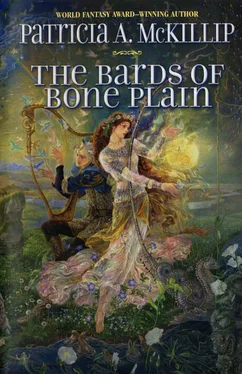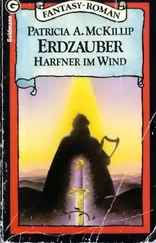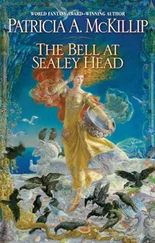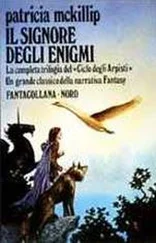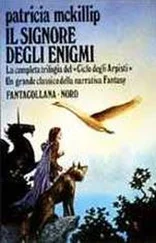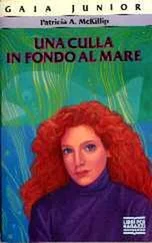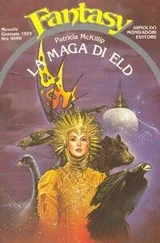“Master Burley told me, when I remembered where I had seen the hooded face on the disk. He said it’s an ancient language in which very common words hold enormous powers. So the theory goes. Nobody has ever been able to read into the words, beneath them. I saw the pattern Kelda drew on the table. It was also on the disk. What does it mean?”
“Bread.”
“Bread.”
“Look in any bakery. You see the pattern still used on cottage loaves.”
“Really?” she said, amazed. “How fascinating. But what is its other meaning? Its secret?”
“You know that, too. You saw its power last night.”
She stared at him again, wordlessly. Standing under the bright noon sun, she felt suddenly chilled and oddly helpless. “All that power,” she whispered, “under my father’s roof.”
“Yes.”
“How—how do you know all this? Where did you first meet Kelda?”
His eyes held hers. For a moment she thought he would answer ; she could almost hear the words gather in the silence between them. Then he shifted abruptly, glancing at the city across the bridge. “Be careful of him,” he only said. “Did he see you last night?”
“I couldn’t tell.”
“Don’t let him find you alone.”
“But what can we do?” she pleaded. “You know this language—Do you have its power?”
He started to answer that, then stopped, and gave her instead a wry, very genuine smile. “I wish I did. Whatever he wants, he’ll wait to take it during the bardic competition. I might be able to change his path then. Just try to stay away from him. And look in on Phelan if you can.”
“Yes,” she said dazedly, and watched him pick his way across the barrens of the ruined city before she descended once again to the simpler mystery of stones.
“What was that about?” Campion asked curiously, as she picked up her brush. She answered with a vague tale of Phelan having an accident while trying to keep his father out of trouble, and his father having to rescue him instead. It sounded solid, she thought, until she glanced up and found Campion’s disconcerting gaze upon her.
“And you had nothing better to do with your evening than rattle around the Caerau waterfront chasing Jonah Cle?”
“You sound like my mother,” she complained, her mouth sliding into a smile in spite of herself. “It didn’t seem odd at the time.”
She found it difficult, after her conversation with Jonah, to keep her mind on her work. The meticulous task of coaxing what was most likely an old brick mantelpiece out of a wall of earth with the equivalent of artists’ brushes and dental tools seemed mildly absurd. It strained her patience, which she had always thought was considerable. Now she wanted to toss her brush on the floor and groan. She gritted her teeth, watched the sunlight shift with painstaking slowness across one bit of grit on the floor, then another. She only realized how the strain of her silence had spread through the site when Curran finally broke it.
“Go,” he told her gently. “Just go where you need to. You’re already out of here and away; you just haven’t caught up with yourself yet.”
She drove the steam car over the bridge, debated about changing her clothes, passed the castle without deciding, and parked along the old, quiet streets where Phelan lived. For a moment, when the ageless Sagan opened the door, she regretted her dungarees and her dusty hair.
He only murmured at a query behind him, “Princess Beatrice, Lady Sophy. Come from the archaeological digs, would be my guess.”
“Sorry,” the princess said to Sophy, wondering how many times she had overworked that word in one morning. But Sophy, who after all had married the mercurial Jonah, only saw what she chose to: the princess on her doorstep.
“How lovely of you to pay us a visit! Jonah is away, but Phelan is here, resting.”
“Yes. How is he?”
“A slight fever. I gave him some meadowsweet tea and took away his inkpots. Please, sit down.”
“I’m a bit untidy.”
“Nonsense. Sagan, please tell Phelan that Princess Beatrice is here.” Beatrice perched herself on the edge of a chair. Sophy fluttered down onto the sofa, adding, with her charming smile, “I’m not at all certain what happened last night. Phelan is vague and Jonah is—well, his usual self. Do you know?”
“Something—” Beatrice managed guardedly. “Only a little.”
The gray eyes, so like Phelan’s, regarded her temperately. There was, Beatrice realized for the first time, a great deal of focus beneath the disarming flightiness Sophy scattered around her as a distraction. It kept her from having to answer questions about her impossible husband. It didn’t keep her from wondering. And now she was asking.
“Yes,” Beatrice blurted. “I know some of it. I don’t understand it all. It’s complex.”
“Well, it would be, wouldn’t it, considering Jonah. Nothing trivial, nothing predictable ... And now, Phelan. I must go out in a few moments. A women’s party: we have secured a barge for Lady Petris, to row her upriver and picnic along the water at a place with a very fine view of the plain. You would be entirely welcome to join us.”
“I’m hardly dressed—”
“And you have come to talk to Phelan. Straight from your dig, and wearing the dust of antiquity in your hair.”
Beatrice brushed at it. “I think it’s barely a couple of centuries old.”
“Not likely to be of great interest, then.”
“Some kind of common brickwork. No. I came rather impulsively.” She hesitated, added as impulsively, “I am sorry to be so mysterious. I simply don’t know exactly what I’m looking at.”
“Jonah does have that effect ... Yes, Sagan?”
“Phelan seems to have gone out,” the butler said apologetically. “Sometime ago, and by way of the kitchen, so he could take his breakfast with him. The cook said he was carrying books; perhaps he’s at the school.”
Sophy ticked her tongue. “My fault entirely: I should have let him work.”
Beatrice stood up. “I’ll look there, then.”
“I have the perfect skirt, Princess Beatrice.”
“I beg—”
“Yes, I’m sure it would fit you, though a bit shorter than you’re used to, since so am I.”
Beatrice smiled. “I’m glad you reminded me. Yes, I would be grateful; I won’t have to stop at home, then.” And sneak around hiding behind pots and doors to elude both my mother and the bard, she did not say. “Thank you, Sophy.”
Her scruffy boots partially hidden under Sophy’s skirt, and most of the dust out of her hair, she drove back down the river road. She turned up the hill to the school, startling a matched pair of skittish grays when she changed gears, and the car let out one of its goose-honks. Halfway up the hill, she braked abruptly, with another clamor of gears and a snort, beside the pale-haired man with an armload of books trudging toward the school.
“Phelan! Get in.”
He cast his brooding glance in her direction, then the thoughts startled out of his eyes. He pulled the door open; he and his books tumbled into the seat beside her. “Princess Beatrice.” He was sweating like a candle and about as pale; his eyes glittered a bit like Jonah’s did after a wild night. “What are you doing up above ground in broad daylight?”
“I came looking for you. Your father couldn’t tell me whether or not you had gotten home safely, and you successfully eluded me when I stopped at your house. Couldn’t you have taken the tram up?”
He shrugged, a smile flickering suddenly into his pained eyes. “I was waiting for you to come by, I suppose. I need more books for my research. And I completely missed my morning class. My students are probably still languishing hopelessly under the oak.”
Читать дальше
